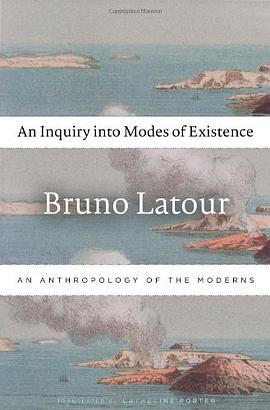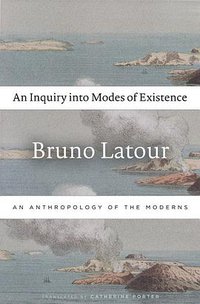An Inquiry into Modes of Existence
豆瓣
An Anthropology of the Moderns
Bruno Latour / Catherine Porter 译者: Catherine Porter
简介
In this new book, Bruno Latour offers answers to questions raised in "We Have Never Been Modern, "a work that interrogated the connections between nature and culture. If not modern, he asked, what "have" we been, and what values should we inherit? Over the past twenty-five years, Latour has developed a research protocol different from the actor-network theory with which his name is now associated--a research protocol that follows the different types of connectors that provide specific truth conditions. These are the connectors that prompt a climate scientist challenged by a captain of industry to appeal to the "institution" of science, with its army of researchers and mountains of data, rather than to "capital-S Science" as a higher authority. Such modes of extension--or modes of existence, Latour argues here--account for the many differences between law, science, politics, and other domains of knowledge. Though scientific knowledge corresponds to only one of the many possible modes of existence Latour describes, an unrealistic vision of science has become the arbiter of reality and truth, seducing us into judging all values by a single standard. Latour implores us to recover other modes of existence in order to do justice to the plurality of truth conditions that Moderns have discovered throughout their history. This systematic effort of building a new philosophical anthropology presents a completely different view of what Moderns have been, and provides a new basis for opening diplomatic encounters with other societies at a time when all societies are coping with ecological crisis.
contents
·Contents·
Ǧ
TOTHE READER: USER’S MANUALFORTHE ONGOING COLLECTIVE INQUIRY ..............XIX
ACKNOWLEDGMENTS.................................................................... XXIII
OVERVIEW................................................................................XXV
Ǧ
·Introduction·
TRUSTING INSTITUTIONS AGAIN?............................................................ 1
A shocking question addressed to a climatologist (02) that obliges us to distinguish values from the accounts practitioners give of them (06).
Between modernizing and ecologizing, we have to choose (08) by proposing a different system of
coordinates (10).
Which leads us to de&ne an imaginary diplomatic scene (13): in the name of whom to negotiate (13) and
with whom to negotiate? (15)
The inquiry at &rst resembles the one involving speech acts (17) while we learn to identify di*erent
modes of existence (19).
The goal is, &rst, to accompany a people vacillating between economy and ecology (22).
Ǧ
PART ONE
HOWTO MAKEAN INQUIRYINTOTHE MODESOF EXISTENCEOFTHE MODERNS POSSIBLE
·Chapter 1·
DEFININGTHE OBJECTOF INQUIRY .........................................................27
An investigator goes o* to do &eldwork among the Moderns (28) without respecting domain boundaries, thanks to the notion of actor-network (30), which makes it possible to distinguish networks as result from networks as process (31).
The inquiry de&nes a &rst mode of existence, the network [NET], through a particular “pass,” or passage (33).
But networks [NET] have a limitation: they do not qualify values (35).
Law o*ers a point of comparison through its own particular mode of displacement (38).
There is thus a de&nition of “boundary” that does not depend on the notions of domain or network (38).
The mode of extension of objective knowledge can be compared with other types of passes (39).
vii
book_en.indd 7 4/23/13 3:01 PM
